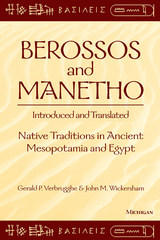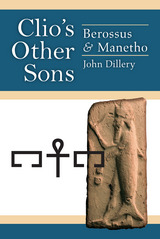2 books about Berosus, the Chaldean

Berossos and Manetho, Introduced and Translated
Native Traditions in Ancient Mesopotamia and Egypt
Gerald P. Verbrugghe and John M. Wickersham
University of Michigan Press, 2001
Berossos and Manetho begins with a general introduction to the cultural history of ancient Mesopotamia and Egypt. It then presents a translation of the only known native narratives, written in Greek, of the histories of these two civilizations. The priest Berossos chronicled the past of ancient Babylon from the mythical creation of the world down to Alexander the Great's conquest in the fourth century b.c.e. For Egypt, the scribe Manetho's list of rulers from the reigns of the gods down to Alexander's conquest remains the basis for the dynastic arrangement of the pharaohs that is still used today.
Berossos and Manetho offers particular emphasis on and discussion of the languages and scripts used to preserve the glorious past of these lands. Each author receives his own special introduction, which describes his life, the sources of his History, the nature and content of his writings, and his goals and accomplishments. There follows a translation of all the surviving ancient information about each author, and of all that can be recovered of his writings. For the first time, Berossos and Manetho--priests and contemporaries who write just when their lands had been pushed into Hellenization--have been translated in one volume.
This volume will appeal to all people interested in ancient Israel, Greek history, and ancient history in general.
Gerald P. Verbrugghe is Associate Professor of History, Rutgers University. John M. Wickersham is Professor of Classics and Classics Department Chairperson, Ursinus College.
Berossos and Manetho offers particular emphasis on and discussion of the languages and scripts used to preserve the glorious past of these lands. Each author receives his own special introduction, which describes his life, the sources of his History, the nature and content of his writings, and his goals and accomplishments. There follows a translation of all the surviving ancient information about each author, and of all that can be recovered of his writings. For the first time, Berossos and Manetho--priests and contemporaries who write just when their lands had been pushed into Hellenization--have been translated in one volume.
This volume will appeal to all people interested in ancient Israel, Greek history, and ancient history in general.
Gerald P. Verbrugghe is Associate Professor of History, Rutgers University. John M. Wickersham is Professor of Classics and Classics Department Chairperson, Ursinus College.
[more]

Clio's Other Sons
Berossus and Manetho
John Dillery
University of Michigan Press, 2015
Soon after the death of Alexander the Great, the priest Berossus wrote the first known narrative and comprehensive history of his native Babylon, and the priest Manetho likewise wrote the first such history of his native Egyptian civilization. Nothing like these histories had been produced before in these cultures. Clio’s Other Sons considers why that is: why were these histories written at this point, and for what purposes?
Berossus and Manetho operated at the crossings of several political, social, and intellectual worlds. They were members of native elites under the domination of Macedonian overlords; in their writings we can see suggestions that they collaborated in the foreign rule of their lands, but at the same time we see them advocating for their cultures. Their histories were written in Greek and betray active engagement with Greek historical writing, but at the same time these texts are clearly composed from native records, are organized along lines determined by local systems of time-reckoning, and articulate views that are deeply informed by regional scholarly and wisdom traditions. In this volume John Dillery charts the interactions of all these features of these historians. An afterword considers Demetrius, the approximate contemporary of Berossus and Manetho in time, if not in culture. While his associates wrote new histories, Demetrius’ project was a rewriting of an existing text, the Bible. This historiographical “corrective” approach sheds light on the novel historiography of Manetho and Berossus.
[more]
READERS
Browse our collection.
PUBLISHERS
See BiblioVault's publisher services.
STUDENT SERVICES
Files for college accessibility offices.
UChicago Accessibility Resources
home | accessibility | search | about | contact us
BiblioVault ® 2001 - 2024
The University of Chicago Press









